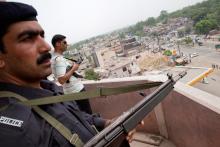Peace and Nonviolence

Talks between the U.S. and Pakistan that concluded with a U.S. apology for a mistaken airstrike that killed 24 Pakistani soldiers resulted in the reopening of supply routes into Afghanistan. Talks on the expanded U.S. use of drones to attack militants inside Pakistan are continuing. While the public line of the Pakistani government is to demand a halt to the strikes, The Express Tribune reports a different picture behind the scenes.
"Pakistani authorities are not pushing the US to halt drone strikes inside its tribal regions and are instead seeking control of human intelligence on the ground for target specification of their choice.
“This is the maximum they have been seeking. Nothing more,” said an official privy to talks held this week between civilian and military leaders from Pakistan and the US that culminated in breaking a seven-month deadlock on the resumption of Nato supplies.…
Control on human intelligence, or Humint as it is technically called, would give Pakistani secret outfits a chance to select targets of their choice to be hit by drones."

Mark Mazzetti, national security correspondent, writes in this Sunday’s New York Times Magazine about the training of drone operators at Holloman Air Force Base in New Mexico.
"Stationing pilots in the United States has saved the Air Force money, and pilots at Holloman who have flown drone combat missions speak glowingly about a lifestyle that allows them to fight a war without going to war. Craig, an Air Force captain who is a trainer at the base, volunteered to fly Predators while in flight school. He calls his job “the perfect balance of mission and family.”
And yet this balance comes at a cost. Pilots have flown missions over Afghanistan in the morning, stopped for lunch, fought the Iraq war in the afternoon and then driven home in time for dinner. Lt. Col Matt Martin, formerly a trainer at Holloman, wrote about the disorienting experience of toggling among different war zones in a memoir, “Predator,” calling the experience 'enough to make a Predator pilot schizophrenic.'"
Archbishop Desmond Tutu writes for CNN on his hopes for peace in Sudan and South Sudan:
"My fellow Elders Martti Ahtisaari, Mary Robinson and I are going there to try to ensure that the terrible lessons of war are not forgotten - and to share our hope that these two beautiful countries can find a path to peace. We will relay the world's fears of another deadly conflict that would shatter the hopes of both nations and the broader region. And we will tell the leaders that, while it will take time and patience, we believe - as a result of our own experience - that peace can be achieved.
One of our main reasons for going to Sudan and South Sudan now is the humanitarian situation, which must be addressed as a matter of urgency. We are already witnessing an unbearable catastrophe with the fighting in Blue Nile and South Kordofan in Sudan, and the ensuing outpouring of refugees into South Sudan and Ethiopia."
Read the full article here

Bloomberg reports:
"The Pentagon is seeking congressional approval to shift as much as $641 million in funding for intelligence and surveillance to priorities such as expanding Afghanistan operations of a Boeing Co. (BA) drone for Navy commandos.
The request for the 'reprogramming' of previously approved military intelligence funds was submitted [Monday] to the four congressional defense committees in a 20-page document."
Specific funding requests include:
“The $94.2 million sought for the ScanEagle drones made by Chicago-based Boeing would provide more ground stations. Six sites operated by contractors in Iraq would be moved to Afghanistan and ground stations operated by Navy SEALs would be doubled to eight from four.” Also requested is “"$2.6 million to purchase hardware and software for an intelligence-gathering and dissemination system the U.S. Africa Command can use to share data with partner nations."
The Methodist Church in Britain has agreed to ask that the U.K. government urge the U.S. to stop using drones in killing suspected terrorists. One concern expressed by  church leaders was that increased reliance on unmanned weapons could make military interventions easier. On other concerns,
church leaders was that increased reliance on unmanned weapons could make military interventions easier. On other concerns,
"A working group of policy experts submitted a report to the Methodist Conference highlighting moral concerns surrounding the use of drones, recognising that armed unmanned aircraft has the potential to transform the use of air power in conflict and counter-insurgency.
Steve Hucklesby, a Methodist policy adviser and member of the working group, said: "If there is a legitimate use for this technology we need a much clearer idea of the boundaries for its use. Terrorists function outside the law. It is vitally important that the UK and its allies do not do so as well. The targeted killings carried out by the CIA in northern Pakistan demonstrate only too clearly the ethical challenges that will face us as this technology proliferates more widely."
Following the Methodist action, The United Reformed Church and the Baptist Union of Great Britain voiced their support for the Conference's decision.
The Associated Press reports a drone strike in Yemen earlier today:
"A Yemeni official says a suspected U.S. drone strike has killed two al-Qaida militants in a car in Yemen's south. Tribal officials there said four militants were killed."

With the wars in Iraq and Afghanistan winding down and the Pentagon budget cuts likely, U.S. weapons manufacturers are looking for ways to keep their profits up. The Los Angeles Times reports that exporting drones might be the next step.
"Despite concerns about U.S.-made drones ending up in enemy hands, American military contractors are lobbying the government to loosen export restrictions and open up foreign markets to the unmanned aircraft that have reshaped modern warfare.
Companies such as Northrop Grumman Corp. and other arms makers are eager to tap a growing foreign appetite for high-tech — and relatively cheap — drones, already being sold on the world market by countries such as Israel and China."
If changes are made in export regulations, expect to see drones becoming common weapons in areas of conflict around the world. It’s a dangerous possibility, but … it’s all about the money.
One of the most respected sources of investigative reporting on drones is The Bureau of Investigative Journalism, a non-profit organization based in London. As part of  its research, TBIJ tracks drone strikes and other US military and paramilitary actions in Yemen, Somalia and Pakistan. Yesterday, TBIJ released its summary for June. The major conclusions:
its research, TBIJ tracks drone strikes and other US military and paramilitary actions in Yemen, Somalia and Pakistan. Yesterday, TBIJ released its summary for June. The major conclusions:
- As relations between Washington and Islamabad continue to falter, Bureau data shows fewer civilians are being killed in CIA drone strikes in Pakistan than at any time in the Obama presidency.
- US military action in Yemen is at its bloodiest ever, with the strike rate and reported casualties the highest yet recorded.
- The true extent of US action in Somalia remain unclear, despite many claims of attacks.
The report also provides a comparison of the first six months of this year with 2011.

As killing by drone continues, anti-drone groups organizing protests against the policy are growing. Last week, 15 people were arrested in a protest outside a New York Air National Guard base near Syracuse. According to the Syracuse Post-Standard
Fifteen people, including a woman in a wheelchair, were arrested for trespassing today during a protest at the New York Air National Guard base at Hancock Field.
The members of the Upstate Coalition To Ground the Drones and End the Wars staged their protest for almost two and a half hours this afternoon, from 11 a.m. to about 1:40 p.m., as New York State Troopers and DeWitt Police stood by appearing to confer with members of the military.
The protestors stood in front of the base’s main gate off Molloy Road, blocking vehicles that attempted to enter.
“There’s war crimes here,” protestor Ellen Grady hollered at a blue Chevrolet Impala as it tried to turn in. “We have to close the base.”

The Associated Press reports
U.S. missiles fired from a drone in a Pakistani tribal region near the Afghan border killed eight suspected militants early Sunday, officials said, as the controversial American strikes continue despite Islamabad's persistent demands that they stop.
Unidentified Pakistani intelligence officials said that four Hellfire missiles were fired at a house in the North Waziristan tribal area used by suspected militants. The eight dead included suspected members of a Taliban faction and some suspected members of the Turkmenistan Islamic Movement.

Earlier this week, former President Jimmy Carter critiqued the United States for its (read: our) deteriorating record on human rights and rule of law in the last decade.
But those responding to Carter's New York Times Op-Ed (“A Cruel and Unusual Record”) have largely missed his main point. In the spirit of the Sermon on the Mount, Carter wants to lead America in removing the log from our own eye in hopes of honoring God and regaining our position as champions of human rights and rule of law.
During his visit to Cairo for the Egyptian elections, Carter met with the Grand Imam of Al Azhar — the most authoritative voice in Sunni Islam. Discussing human rights, religion, and the historic election that was taking place outside, Carter exhibited a rare humility in articulating his convictions. I feel that a whole range of human interactions might be improved if we would each remove the log from our own eye before trying to remove the speck from our neighbor’s.
Sitting with women’s rights activists and top Christian leadership; in private briefings and press conferences, this self-critique proved central to Carter’s efforts to build trust and advance human rights in Egypt and around the world.
After decades of lectures from the White House and U.S. State Department, much of the world has grown tired of the West’s wagging finger and “holier than thou” attitude. There may have been an era when this posture had a greater effect, but the U.S. has lost too much of its moral credibility in the wake of Abu Ghraib, Guantanamo, and drone strikes carried out against the President Obama's “Hit List”.
The New York Times reports:

WASHINGTON — The Ahmadiyya Muslim Community is persecuted around the world, but it has plenty of friends on Capitol Hill.
House Minority Leader Nancy Pelosi, D-Calif., joined more than 20 House colleagues and at least one senator on June 27 at a reception to mark the first visit of the Ahmadiyya’s spiritual leader, Hadhrat Mirza Masroor Ahmad, to Congress.
The Ahmadiyya have faced severe repression, Pelosi said, “but you refused to turn to bitterness or vengeance.”
“The message we carry is 'if you are being hurt, do not respond with hurt,'" said Ahsanullah Zafar, president of the Ahmadiyya community in the U.S.
The Pakistani newspaper DAWN reported this morning that the National Research and Development Foundation (NRDF), a national NGO, has appealed to the U.S. to  stop drone attacks. NRDF has been promoting polio vaccinations in the tribal area where the strikes occur. The appeal follows a Taliban decision to ban the vaccinations due to fear of their possible relation to CIA intelligence gathering for targeting drones.
stop drone attacks. NRDF has been promoting polio vaccinations in the tribal area where the strikes occur. The appeal follows a Taliban decision to ban the vaccinations due to fear of their possible relation to CIA intelligence gathering for targeting drones.
Tehseenullah Khan, NRDF coordinator, told DAWN that “The ban will adversely affect 318,000 children in the two agencies.” He continued, “Stoppage of drone strikes by the US could safeguard children against host of diseases. Fata [the Federally Administered Tribal Areas] is the only active hub of active polio virus transmission in the country that has contributed more than 50 per cent of the total polio cases this year.”

Editor's Note: This piece is part of a longer series on the wave of violence hitting Chicago, with murders for the year reaching the 250 mark this week. Some think the solution is purely over-policing or sending in the National Guard. Mayor Rahm Emanuel may legalize small amounts of marijuana so police can focus on violent crime. We asked some contributors—people who are on the ground in Chicago working for change—to discuss real, creative solutions.
For all its deep dish pizzas and –style hot dogs, The Crib is one of the most violent cities in the world.
When I say in the world, I mean that 1,976 Americans have died in Afghanistan since 2001, and there have been 5,056 murders in Chicago during the same period. (A specious stat for a number of reasons, but let’s move toward the point people are getting at when they mention this). This is a dangerous town. “How do we stop it?” is the million dollar question, and will net someone a Nobel Peace Prize if they can figure it out.

Billy Sunday was the most famous evangelist in America during the first two decades of the 20th century. Without the aid of loudspeakers, TV or radio, Sunday preached to over 100 million people the classic evangelical gospel that remains familiar to many people today. Repent and believe in Jesus, who died on the cross for your sins, and be saved from eternal damnation. The simplicity of Sunday’s message prompted millions of early 20th century Americans to examine the state of their souls and consider their eternal fates. Yet when it came to conscientious objectors during World War I, Sunday spared no mercy:
The man who breaks all the rules but at last dies fighting in the trenches is better than you God-forsaken mutts who won’t enlist.
Throughout our nation’s history, it’s been an axiom that Presidents lead us into wars, while Christians provide the flags and the crosses. Barring a few notable exceptions — Anabaptists, Quakers, and early Pentecostals — evangelical fervor has often promoted an uncritical nationalism that baptizes American military adventures with religious legitimacy. It’s no coincidence that the setting of Mark Twain’s famous War Prayer —in which Twain delivers a devastating critique of the use of religion to justify imperialism — is a Protestant Christian church. Given the historical record, it may seem the deck is stacked against American evangelicals organizing into a comprehensive peace movement — yet that’s exactly what’s happening.
According to Guardian, a third Taliban leader has banned polio vaccinations in the area he controls, citing fears that health workers are gathering intelligence for use in targeting drone strikes. From the report:
"Leaflets distributed in South Waziristan on behalf of Mullah Nazir, the leader of the Federally Administered Tribal Agencies (Fata) accused health workers who administer anti-polio drops of being US spies. "In the garb of these vaccination campaigns, the US and its allies are running their spying networks in Fata which has brought death and destruction on them in the form of drone strikes," the leaflet said."
It would seem that the concerns may have some merit. Shakil Afridi, a doctor who ran a hepatitis vaccination campaign, used it as cover to provide the CIA with intelligence that assisted in locating Osama bin Laden. Is that mixing of health care with intelligence gathering continuing?
In 2010, Shahzad Akbar, an attorney and founder of the Pakistani Foundation for Fundamental Rights, began filing lawsuits in Pakistan on behalf of drone strike victims.  His work, according to MSNBC:
His work, according to MSNBC:
“has raised awareness of the strikes among the general Pakistani population – at the same time anti-American sentiment from a failing alliance with the U.S. is on the rise. He said his mission is to seek justice on behalf of innocent civilians killed in the drone attacks.”
When he began, little was known in Pakistan about the strikes, most of which take place in the remote, western tribal area. But now:
“Today, drones have become a political touchstone, regularly decried as part of politician's campaign speeches, prominently featured in fiery protest rallies, and sitting squarely at the center of a diplomatic war of words between the U.S. and Pakistan. … Though public perception may help him to gain traction, Akbar said his cases are based on the evidence he's gathering from strike locations in coordination with communities in North Waziristan, the tribal agency in which the overwhelming majority of strikes have occurred.”
What drives him to do this work?
"I believe in very simple principles that were taught to us by the West," said Akbar. "That everyone is presumed innocent unless proven guilty. So anyone who is killed in drone strikes, unless and until his guilt is established in some independent forum – that person is innocent."
The Economist reports on the growing tensions in the Middle East following the shooting down of a Turkish plane by Syrian forces:
"Turkey, a NATO member, was set to hold emergency talks at the alliance’sheadquarters in Brussels on Tuesday. Hillary Clinton, America’s Secretary of State, confirmed that the matter would be also brought before the United Nations Security Council. Meanwhile the European Union has agreed on new sanctions against Syria. These include banning insurance and re-insurance of arms shipments to Syria. Yet, in a further sign of western reluctance to intervene militarily Catherine Ashton, the EU’s foreign policy chief, stated “We will obviously be looking to Turkey to be restrained in its response.”
"The most Turkey can hope for is verbal condmenations," said a western diplomat in Ankara. Turkish officials insist that Turkey must respond forcefully otherwise its claims at regional leadership will be badly dented as will Mr Erdogan's image at home.
The Turkish media has speculated about an array of options including targeted airstrikes against Syrian military installations and the establishment of a buffer zone along Turkey's 900 kilometre wide border with Syria. But many observers say it is unlikely that Turkey will risk war with Syria."
Read more here
In what appears to be a step in the right direction, Congress is paying more attention to drone strikes. From the LA Times:
"Once a month, a group of staff members from the House and Senate intelligence committees drives across the Potomac River to CIA headquarters in Virginia, assembles in a secure room and begins the grim task of watching videos of the latest drone strikes in Pakistan and Yemen. …
The regular review of some of the most closely held video in the CIA's possession is part of a marked increase in congressional attention paid to the agency's targeted killing program over the last three years. The oversight, which has not previously been detailed, began largely at the instigation of Sen. Dianne Feinstein (D-Calif.), chairwoman of the Senate Intelligence Committee, ...
In addition to watching video, the legislative aides review intelligence that was used to justify each drone strike. They also sometimes examine telephone intercepts and after-the-fact evidence, such as the CIA's assessment of who was hit."
One of the major criticisms of drone attacks is the lack of transparency and accountability. So, on the one hand, more Congressional oversight is good. On the other hand:
"Members of the oversight committees are limited in their ability to challenge the CIA's conclusions, a senior staff member cautioned. "I can watch video all day long — I'm not an imagery analyst," he said. "I can only look to see if the description reasonably concurs with what my untrained eyes are seeing."